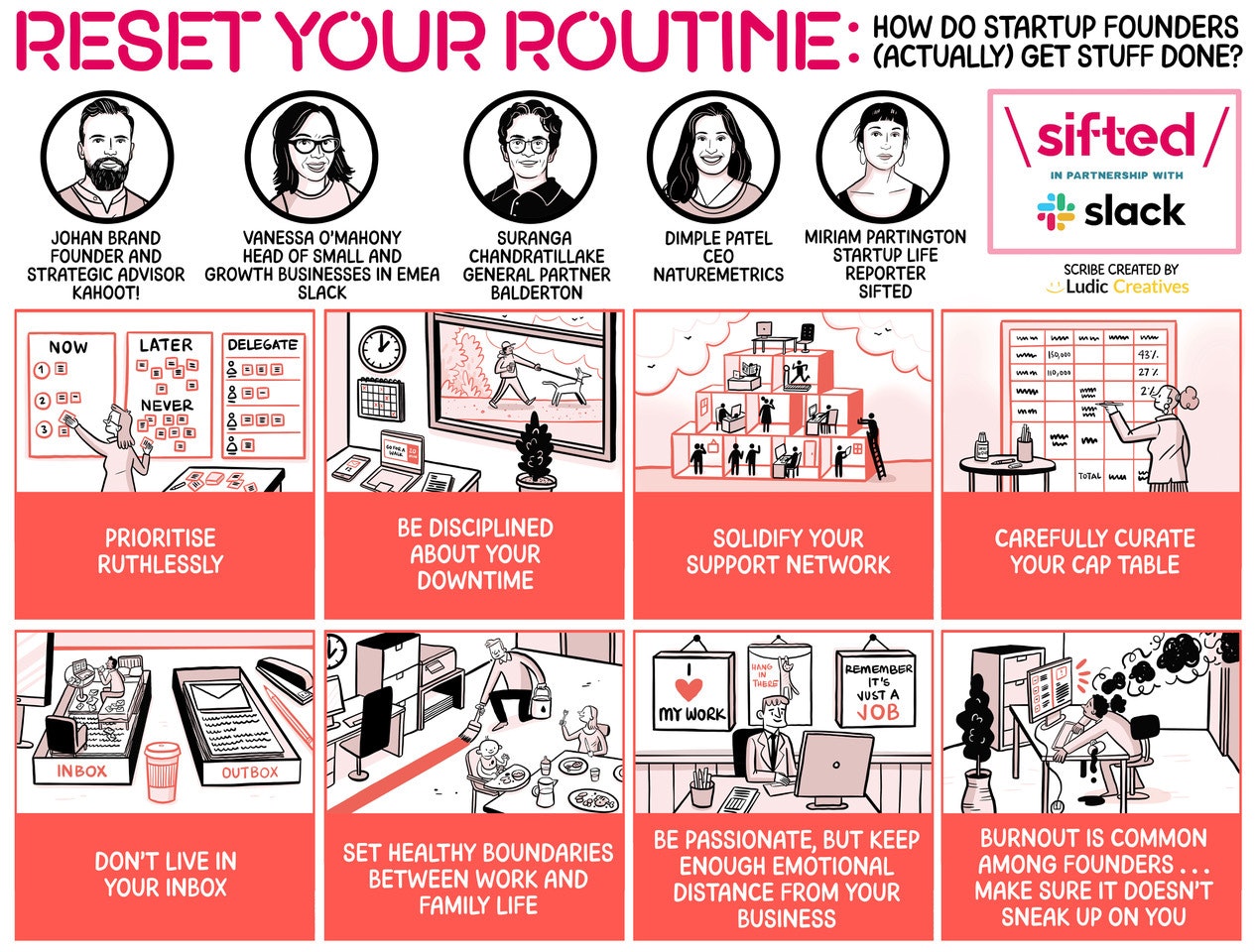It’s tough being a founder: pressure from investors, employees and customers is relentless and there’s constant risk of company closure, as 90% of startups fail.
Building a healthy routine is therefore critical to long-term success, since great companies take decades, and not years, to build.
“There's a certain level of obsession… but you need to regulate how far you head down the rabbit hole,” says Dimple Patel, CEO of biodiversity-monitoring startup NatureMetrics, which raised £10m in August.
So, how can founders maintain the stamina required to stick it out to a planned exit? What will help you navigate the high pressures of the job?
In our latest Sifted Talks, we asked founders and investors to share their tips. Our panel featured:
- Johan Brand, founder of edtech unicorn Kahoot! and founding partner of We Are Human, a company-builder and investor
- Dimple Patel, CEO at biodiversity startup NatureMetrics. She was formerly CEO at boutiques platform Trouva — and has negotiated multiple exits
- Suranga Chandratillake, general partner at VC fund Balderton and founder of search engine Blink, which he led to IPO at a $250m valuation
- Vanessa O’Mahony, head of small and growth businesses in EMEA at Slack, the popular messaging app
Here’s what we learned:

1/ Prioritise ruthlessly
As a founder, you’re likely to want total visibility and control across all operations. However, as the business scales, you need to strategically and tactically plan where you invest your time.
Reflecting on his time as CEO at edtech unicorn Kahoot!, Johan Brand said: “My biggest mistake was taking every challenge as the biggest challenge in the world.”
Founders should focus on what matters most over the next six months and delegate everything else. “You've got to be brutal, whether it's with calendaring, an assistant if you have one or just telling your team, ‘I'm just not going to be on these calls anymore,’” said Suranga Chandratillake.
“When I was a CEO, I don't think I practised that well at all and I think it's one of the reasons I was a CEO for 10 years, and not 20 years,” — Suranga Chandratillake, Balderton
2/ Be disciplined about your downtime
84% of founders feel that there’s an expectation to always work long hours to be successful, according to a recent report by VC firm Balderton.
However, overwork has diminishing returns: in the same report, 83% of founders said that after a point more time clocked doesn’t produce good results.
Working longer hours can be counterproductive, but it’s challenging for founders to take time out. “For years, I would go on holiday and still be checking my phone every day… but over time I’ve been able to see [switching off] as a way of stress testing the internal operations of the business,” said Patel.
Founders who step back can set the right tone for their team. “Stewart Butterfield [Slack’s CEO] walked that walk for us and was very vocal about ensuring we're not interrupting people's downtime,” added Vanessa O’Mahony.
“Listen to your wife or girlfriend or boyfriend when they tell you it's time to stop,” — Johan Brand, Kahoot! and We are Human
3/ Don’t live in your inbox
Getting to Inbox Zero is a badge of honour for some startup folk, but not all. “I have about 800 unanswered emails and I have no ambition of answering all of them,” confessed Brand.
Clocking too much time on email can distract from strategic work, so set clear boundaries around when you're doing deep work and when you're available, advised O’Mahony.
AI can help to lift some of the inbox load, for instance Balderton uses it to sift through the thousands of inbound emails they receive from founders every month. However, only 27% of workers are tapping into it today, according to Slack research.
“AI has really exploded… I think 2024 will be the year where its used to supercharge productivity,” – Vanessa O’Mahony, Slack
4/ Solidify your support network
Building a fast-paced startup can be a lonely endeavour. Finding and creating support networks can help to relieve some of the pressure.
“When I was a CEO, one of the few things that worked really well was being in a group of other founders and CEOs. It was never about tactical commercial stuff,” said Chandratillake. “It was much more about the job and life in general.”
Surrounding yourself with people who you can have honest conversations with also helps when shit hits the fan… which it will.
“As a CEO, I was protecting too much. I was taking on all of the fights myself,” said Brand. “It's nice to have someone separate from your sector or your business who you can be more open with.”
“When we are so in the weeds of building a business, we lack a little bit of perspective. Getting people around can pull you out a bit and reset you,” — Dimple Patel, NatureMetrics
5/ Carefully curate your cap table
The pressure on founders from investors has intensified over the last 12 months: 51% of Sifted readers said they’d been getting on worse with their investors since the downturn hit.
But investors who have founded — or scaled —— a startup are more likely to “fight your corner” during tough times, said Brand.
“Reference like crazy” before signing on the dotted line, advised Chandratillake. Ask the fund for references, but supplement that with your own research: speaking to a founder who was badly burned might make you reconsider.
“You have to pick up investors in the same way as you do with employees: give yourself time and don’t be desperate,” — Brand
Like this and want more? Watch the full Sifted Talks here:



